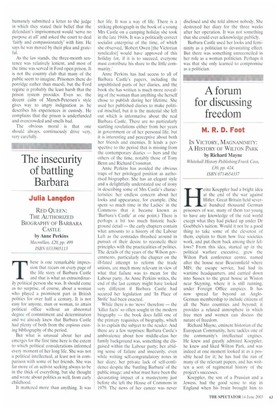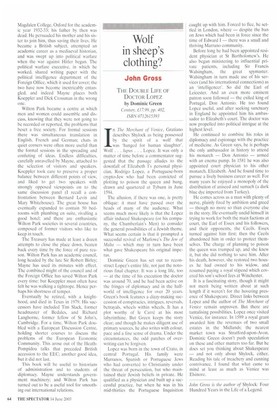A forum for discussing freedom
M. R. D. Foot
IN VICTORY, MAGNANIMITY: A HISTORY OF WILTON PARK by Richard Mayne Whitehall History Publishing/Frank Cass, £30, pp. 424, ISBN 071454337 Heinz Koeppler had a bright idea at the end of the war against Hitler. Great Britain held several hundred thousand German prisoners of war, many of them too young to have any knowledge of the real world except what they had picked up under Dr Goebbels's tuition. Would it not be a good thing to take some of the cleverest of them, explain to them how free societies work, and put them back among their fellows? From this idea. started up in the political warfare executive, grew the Wilton Park conference centre, named after the house near Beaconsfield where MI9, the escape service, had had its wartime headquarters, and carried down into Sussex to the great house at Wiston near Steyning, where it is still running, under Foreign Office auspices. It has now spread far beyond an AngloGerman membership to include citizens of all the Nato countries and beyond; it provides a relaxed atmosphere in which free men and women can discuss the nature of freedom.
Richard Mayne, eminent historian of the European Community, here tackles one of the community's intellectual engines. He knew and greatly admired Koeppler, he knew and liked Wilton Park, and was indeed at one moment looked at as a possible head for it; he has had the run of many of the relevant papers, and has written a sort of regimental history of the project's successes. Koeppler, the son of a Prussian and a Jewess, had the good sense to stay in England when his brain brought him to Magdalen College, Oxford for the academic year 1932-33; his father by then was dead. He persuaded his mother and his sister to join him, thus saving their lives. He became a British subject, attempted an academic career as a mediaeval historian, and was swept up into political warfare when the war against Hitler began. The political warfare executive, in which he worked, shared writing paper with the political intelligence department of the Foreign Office, which it used for cover; the two have now become inextricably entangled, and indeed Mayne places both Koeppler and Dick Crossman in the wrong one.
Wilton Park became a centre at which men and women could assemble and discuss, knowing that they were not going to be recorded or reported, the problems that beset a free society. For formal sessions there was simultaneous translation in English, French and German; chats in quiet corners were often more useful than the formal sessions in the spreading and confuting of ideas. Endless difficulties, carefully unravelled by Mayne, attached to the selection of visitors and speakers. Koeppler took care to preserve a proper balance between different points of view, and liked to get two speakers with strongly opposed viewpoints on to the same discussion panel (I recall a confrontation between Bernard Levin and Mary Whitehouse). The great house has eventually expanded to contain 50 bedrooms with plumbing en suite, rivalling a good hotel; and there are enthusiastic Wilton Park societies in several countries, composed of former visitors who like to keep in touch.
The Treasury has made at least a dozen attempts to close the place down, beaten back every time by the force of pure reason. Wilton Park has an academic council, long headed by the late Sir Robert Birley; Mayne has used its minutes with effect. The combined might of the council and of the Foreign Office has saved Wilton Park every time; but Koeppler must often have felt he was walking a tightrope. Hence perhaps his shortness of temper.
Eventually he retired, with a knighthood, and died in Texas in 1979. His successors have included Tim Slack, former headmaster of Bedales, and Richard Langhorne, former fellow of St John's, Cambridge. For a time, Wilton Park doubled with a European Discussion Centre, holding shorter courses to discuss the problems of the European Economic Community. This arose out of the HeathPompidou talks that preceded British accession to the EEC; another good idea, but it did not last.
This hook will be useful to historians of administration and to students of diplomacy. Mayne understands government machinery; and Wilton Park has turned out to be a useful tool for smoothing out international relations.



































































































 Previous page
Previous page